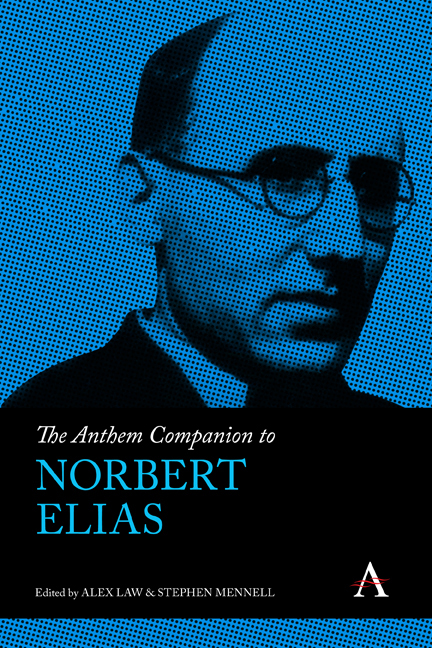Book contents
- Frontmatter
- Contents
- Notes On Contributors
- Acknowledgments
- Introduction: The Sociological Promise of Norbert Elias
- One Norbert Elias: Genesis of a Determined Thinker
- Two Knowledge, Science and Method: The Sociological Practice of Norbert Elias
- Three Norbert Elias’s Comparative Historical Sociology: Against Process Reduction
- Four Power and Process: Norbert Elias and the Paradox of Inequalities
- Five Norbert Elias and Shifting Gender Relations
- Six Travelling With Elias: Figurations and the Racialising Process in South Africa
- Seven Excitement Processes, Embodiment and Power Relations in Sport and Leisure
- Eight Warfare, Survival Units, National Habitus and Nationalism: Norbert Elias’s Contribution to Political Sociology
- Nine Elias’s Contribution to International Relations Theory: Towards a Global Sociology
- Ten Crime, Government and Civilisation: Rethinking Elias in Criminology
- Eleven Art and the Civilising Process
- Twelve From Social Mobility to Channels of Opportunity: Norbert Elias and Education
- Appendix: Published Works of Norbert Elias in English
- Index
Eight - Warfare, Survival Units, National Habitus and Nationalism: Norbert Elias’s Contribution to Political Sociology
Published online by Cambridge University Press: 28 February 2024
- Frontmatter
- Contents
- Notes On Contributors
- Acknowledgments
- Introduction: The Sociological Promise of Norbert Elias
- One Norbert Elias: Genesis of a Determined Thinker
- Two Knowledge, Science and Method: The Sociological Practice of Norbert Elias
- Three Norbert Elias’s Comparative Historical Sociology: Against Process Reduction
- Four Power and Process: Norbert Elias and the Paradox of Inequalities
- Five Norbert Elias and Shifting Gender Relations
- Six Travelling With Elias: Figurations and the Racialising Process in South Africa
- Seven Excitement Processes, Embodiment and Power Relations in Sport and Leisure
- Eight Warfare, Survival Units, National Habitus and Nationalism: Norbert Elias’s Contribution to Political Sociology
- Nine Elias’s Contribution to International Relations Theory: Towards a Global Sociology
- Ten Crime, Government and Civilisation: Rethinking Elias in Criminology
- Eleven Art and the Civilising Process
- Twelve From Social Mobility to Channels of Opportunity: Norbert Elias and Education
- Appendix: Published Works of Norbert Elias in English
- Index
Summary
The main purpose of this chapter is to present Norbert Elias's core contribution to political sociology. During Elias's lifetime, he was famed for his book On the Process of Civilisation and his attempt to develop an alternative to mainstream sociological theory. Although most sociologists would agree that parts of Elias's work would count as political sociology only a very few would characterise him as a ‘political sociologist’ in a narrow sense. Our aim is not to prove that he was more a political sociologist than anything else but to demonstrate that Elias made a significant contribution to political sociology – a contribution which often is overlooked, neglected or forgotten. We also hope to persuade political sociologists to go back and read Elias because his theoretical concepts and analyses are more relevant today than ever. In other words, there is an important Eliasian legacy we need to explore.
Elias was enormously prolific and so we cannot present and discuss his entire political sociology within this chapter. Therefore, we have decided to look into a particular problematique – the problem of state formation, consolidation and decline, and how these processes are closely connected with other processes of violence and warfare – a central turning point in Elias's sociological theory. We will then move on to his key concepts: survival units and figurations. Subsequently, we will present some of Elias's ideas about community, civil society, we-feeling, national habitus, nationalism and the nationstate. The chapter is structured according to key interrelated aspects of European state formation processes:
1. Elias and state formation theory
2. Survival units and human development: war as a constant
3. What is a survival unit?
4. European civilising processes, figurational dynamics and competing survival units
(AD 800–1500)
5. National habitus and nation state
6. We-feelings and nationalism
7. Concluding remarks: from sharp observation to innovative theoretical consistency
1. Elias and State-Formation Theory
In the field of state-formation research, we find a number of competing theories and approaches with different emphases and explanatory factors, embedded in philosophies of science that, in some cases, operate with a range of independent or intermediate variables.
- Type
- Chapter
- Information
- The Anthem Companion to Norbert Elias , pp. 149 - 166Publisher: Anthem PressPrint publication year: 2023



